英语句型变化规律
英语基本句型结构讲解英语基本句型变短变化的知识讲解

英语基本句型结构讲解英语基本句型变短变化的知识讲解
本文是小编精心为你整理的范文模板,仅供参考!就来带你一起学习下,仅供参考。
经过总结与分析,我们发现在这些众多的小变化中存在一些大规律,从而使语法简化、条理清晰,学起来特别轻松、快捷,并对分析句子结构和自己造成句有非常重要的指导作用。
总共有4条变化规律:变短、变长、移位、替换词语。
1.变短
我们所看到的英语句子,有一些省去了一个或者多个句子成分,也有些省去了一个句子成分的一部分。
例如:
(You)Come.
(你)来。
(省略了主语,属于句型2)
(He is)Coming.
(他)就来了。
(省略了主语和助动词,属于句型2)
e.
(是)我。
(省略了主语和系动词,属于句型1)
Do you like English?
你喜欢英语吗?
Yes (I like English).
是的。
(全省略了,属于句型3)
e(told me that).
简。
(省略了谓语、两个宾语,属于句型4) e back).
我们老师(叫我回去)。
(省略了谓语、宾语、宾补,属于句型5)。
英语句型转换常规基本句式的转换方法

英语句型转换常规基本句式的转换方法英语句型转换常规基本句式的转换方法、技巧点拨“句型转换”有两种形式,一是按要求转换句型(如:要求将陈述句转换为否定句或一般疑问句;改为祈使句或感叹句;对划线部分提问等);二是“同义句转换”。
本题型在中考中重要是测试我们运用英语“句型”的能力。
“四位一体”的“句型转换”专项训练,就是为了发展我们这方面的能力。
第一类题型的转换,重点是基本句型的运用,一般都有规律可循。
除了熟记基本句式的结构外,还要注意some, any; already, yet 等词在转换时的变化。
第二类句型转换(同义句转换)应该作为我们复习训练的重点。
用不同的句式表达相同的意思,它标志着一个人的外语能力水平。
提高此项能力的关键是熟悉句型结构,自如运用。
通过“专项训练”,积累一定数量的相关句式,达到脱口而出,信手拈来,出神入化。
基本句式的转换主要是指“肯定句、否定句、一般疑问句、特殊疑问句、反意疑问句和选择疑问句、祈使句、感叹句”的相互转换。
句式的转换一般都有一定的规律可循,我们就是要掌握它们的变化规律,能够举一反三,见此知彼。
(一)肯定句、否定句、一般疑问句的相互转换这三种句型的转换有共同的规律可循,有几个要点必须牢记。
我们可以把各种句式归为两大类:1、含有的be动词、助动词和情态动词的句子;2、只有行为动词的句子。
第1类的句子,肯定句改为否定句时,一律在be动词、助动词和情态动词后加“not”,改为一般疑问句时,一律将be 动词、助动词和情态动前移到句首(首字母大写)。
肯定回答用“Yes”;否定回答用“No”。
“Yes”或“No”后面的主语必须用代词,“No”后面必须用否定缩略式。
如:将下列句子改为否定句、一般疑问句,并做肯定、否定回答:1. There are some computers in this school.(be动词)There aren’t any computers in this school. Are there any computers in this school (Yes, there are. / No, there aren't.)2. Li Min g’s father can drive the car. (情态动词)Li Ming’s father can’t drive the car.Can Li Ming’s father drive the car (Yes, he can. / No, he can’t.)3. She has already finished his homework now. (助动词)She hasn’t finished his homework yet.Has she finished his homework yet (Yes, she has. / No, she hasn’t.)第2类句子必须借助助动词do; does; did。
初中英语中常见93个不规则动词的变化规律
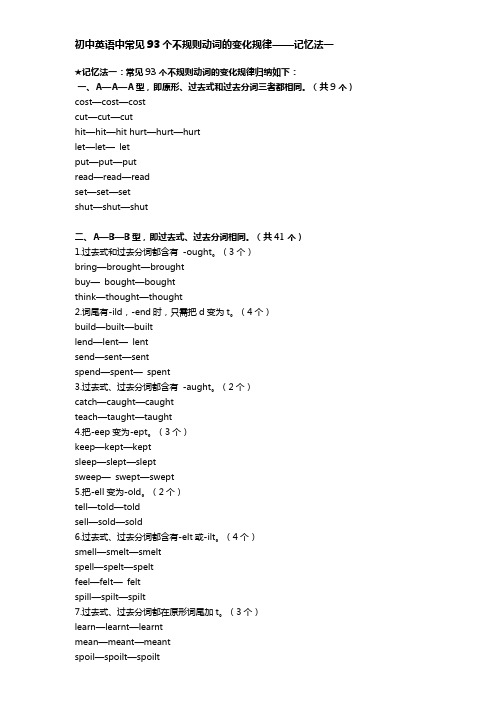
初中英语中常见93个不规则动词的变化规律——记忆法一★记忆法一:常见93个不规则动词的变化规律归纳如下:一、A—A—A型,即原形、过去式和过去分词三者都相同。
(共9个)cost—cost—costcut—cut—cuthit—hit—hit hurt—hurt—hurtlet—let—letput—put—putread—read—readset—set—setshut—shut—shut二、A—B—B型,即过去式、过去分词相同。
(共41个)1.过去式和过去分词都含有-ought。
(3个)bring—brought—broughtbuy—bought—boughtthink—thought—thought2.词尾有-ild,-end时,只需把d变为t。
(4个)build—built—builtlend—lent—lentsend—sent—sentspend—spent—spent3.过去式、过去分词都含有-aught。
(2个)catch—caught—caughtteach—taught—taught4.把-eep变为-ept。
(3个)keep—kept—keptsleep—slept—sleptsweep—swept—swept5.把-ell变为-old。
(2个)tell—told—toldsell—sold—sold6.过去式、过去分词都含有-elt或-ilt。
(4个)smell—smelt—smeltspell—spelt—speltfeel—felt—feltspill—spilt—spilt7.过去式、过去分词都在原形词尾加t。
(3个)learn—learnt—learntmean—meant—meantspoil—spoilt—spoilt8.过去式、过去分词词尾是d。
(4个)say—said—saidpay—paid—paidlay—laid—laidhear—heard—heard9.改变元音字母。
英语句型变化方法

一、一般现在时态一般现在时:表示经常性的事情,经常性的动作或一般性事实。
时间状语:often 经常,usually通常,always 总是,every每个,sometimes 有时,at …在几点钟, every day (year, month ),like.be动词(am ,is, are)1.am 用于第一人称I2.is用于第三人称(he ,she, it,或其他人名)或单数3.are用于第二人称单数you和复数you,第三人称复数they和其他复数.变第三人称单数:一般现在时中的动词主语是第三人称单数(he ,she, it,或其他人名)行为动词要加s或es,其他人称用原形。
(只有在第三人称单数用动词的“三单变化”,其他用动词的原形。
)动词第三人称单数变化规则: 1、多数在动词后加 s ; 如:work--works, live--lives, play--plays, sing-- sings.2. 以s, x, sh, ch, o 结尾的动词加 -es ,teach------ teaches, wash----- washes, go- goes3、以辅音字母加y结尾的动词,把y改为i再加es如:fly →flies carry →carries study →studies注意:play-plays 因为a是元音,所以直接加s特殊变化:have→has do—does改一般疑问句的方法:1.看句中有无be动词(am /is / are)或情态动词(can,would)若有直接把be动词(am /is / are)或情态动词(can,would)提句首,第一个字母大写。
2.若无be动词或情态动词,借助助动词do,第三人称单数用does,行为动词用原形。
3.把I / We改为you, ,my / our改为your,some改为any4.在句尾加问号“?”改为否定句的方法:1.看句中有无be动词(am /is / are)或情态动词(can,would),若有直接加not am not = am notis not= isn't arenot= aren'tcannot=can't would not=wouldn’t2. 若无be动词或情态动词,主语是第三人称单数用doesn't,行为动词用原形,其他人称用don't如果主语是i , you ,we,they 就在主语后面加don't如果主语是he , she ,it 或人名就在主语后面加都doesn't例如:They like eggplants -----They don't like eggplantsChen Jie has English on Monday ----Chen Jie doesn't have English on Monday单数变复数的变化规律:1.大多数在名词后加s。
英语中的句型变化

英语中的句型变化,基本规律如下:一. 含有be动词,如am is are 或者情态动词如can 的句子,(以后还会学到含有助动词如have的句子),其句型变化都围绕着be动词或情态动词作文章。
1.肯定陈述句变否定陈述句,在be动词或情态动词后加not即可.例如:He is from China.(肯定陈述句) I can spell it.He is not from China.(否定陈述句)I can not / can’t spell it. 2.陈述句变一般疑问句,把be动词或情态动词提到主语前面即可。
例如:He is from China.(陈述句) I can spell it .Is he from China ? (一般疑问句) Can you spell it ?(注意:陈述句的主语是“我”或者“我们”,疑问句的主语按常识应变为“你”或者“你们”)而一般疑问句的回答,只需判断是或者不是,是,用yes ,后跟主语和be动词或情态动词;不是,用no 后跟主语加be动词或情态动词再加not例如:Is he from China ? (一般疑问句)Yes , he is.(肯定回答) No , he is n’t . (否定回答)Can you spell it ?Yes , I can . No, I can’t . (注意,问的是你,回答要变为我)3.至于特殊疑问句,要看针对什么来问。
七年级常考的是对划线部分提问,应对方法是它划什么就问什么。
如:划时间就问是什么时间,划地点就问是在哪儿,划原因就问为什么,划方式就问是怎样,等等。
例如: Jane is from Canana . (对划线部分提问)Where is Jane from ?This is a ruler .(对划线部分提问)What is this ?检验方法:提出的问题,能用原句回答就对,不能回答就错。
二.句子中的动词若是实义动词(含实际意义的动词),句型变化就要借助于助动词(助动词,顾名思义,就是帮助动词的词。
英语不规则动词的变化规律
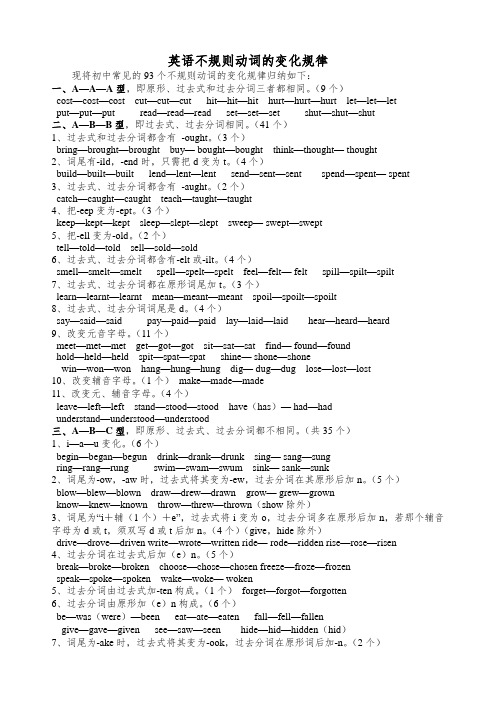
英语不规则动词的变化规律现将初中常见的93个不规则动词的变化规律归纳如下:一、A—A—A型,即原形、过去式和过去分词三者都相同。
(9个)cost—cost—cost cut—cut—cut hit—hit—hit hurt—hurt—hurt let—let—let put—put—put read—read—read set—set—set shut—shut—shut二、A—B—B型,即过去式、过去分词相同。
(41个)1、过去式和过去分词都含有-ought。
(3个)bring—brought—brought buy— bought—bought think—thought— thought2、词尾有-ild,-end时,只需把d变为t。
(4个)build—built—built lend—lent—lent send—sent—sent spend—spent— spent3、过去式、过去分词都含有-aught。
(2个)catch—caught—caught teach—taught—taught4、把-eep变为-ept。
(3个)keep—kept—kept sleep—slept—slept sweep— swept—swept5、把-ell变为-old。
(2个)tell—told—told sell—sold—sold6、过去式、过去分词都含有-elt或-ilt。
(4个)smell—smelt—smelt spell—spelt—spelt feel—felt— felt spill—spilt—spilt7、过去式、过去分词都在原形词尾加t。
(3个)learn—learnt—learnt mean—meant—meant spoil—spoilt—spoilt8、过去式、过去分词词尾是d。
(4个)say—said—said pay—paid—paid lay—laid—laid hear—heard—heard9、改变元音字母。
英语不规则动词的变化规律

语法:英语不规则动词的变化规律一、A—A—A型,即原形、过去式和过去分词三者都相同。
(共9个)cost—cost—costcut—cut—cuthit—hit—hithurt—hurt—hurtlet—let— letput—put—putread—read—readset—set—setshut—shut—shut二、A—B—B型,即过去式、过去分词相同。
(共41个)1 过去式和过去分词都含有-ought。
(3个)bring—brought—broughtbuy— bought—boughtthink—thought— thought2 词尾有-ild,-end时,只需把d变为t。
(4个)build—built—builtlend—lent— lentsend—sent—sentspend—spent— spent3.过去式、过去分词都含有-aught。
(2个)catch—caught—caughtteach—taught—taught4.把-eep变为-ept。
(3个)keep—kept—keptsleep—slept—sleptsweep— swept—swept5 把-ell变为-old。
(2个)tell—told—toldsell—sold—sold6.过去式、过去分词都含有-elt或-ilt。
(4个)smell—smelt—smeltspell—spelt—speltfeel—felt— feltspill—spilt—spilt7.过去式、过去分词都在原形词尾加t。
(3个)learn—learnt—learntmean—meant—meantspoil—spoilt—spoilt8.过去式、过去分词词尾是d。
(4个)say—said—saidpay—paid—paidlay—laid—laidhear—heard—heard9.改变元音字母。
(11个)meet—met—metget—got—got sit—sat—satfind— found—foundhold—held—heldspit—spat—spatshine— shone—shonewin—won—wonhang—hung—hungdig— dug—duglose—lost—lost10.改变辅音字母。
英语句型变化规律
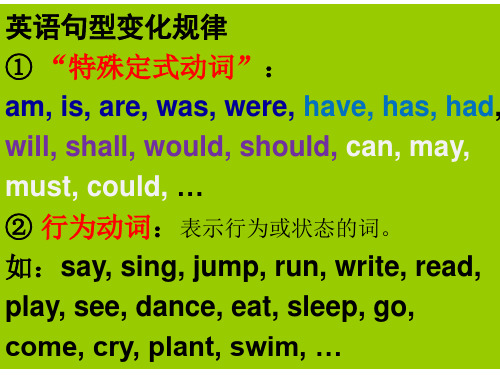
6. I watched TV with my family yesterday evening. → I didn’t watch TV with my family yesterday evening.
注意:
如果行为动词是现在式,则在don’t和doesn’t之 间确定。动词是原形,就don’t; 动词后面有加s或es, 就doesn’t.
Yes, he did. No, he didn’t.
10. They found a nice place to live at last.
They didn’t find ….
Did they find …?
Yes, they did. No, they didn’t.
11. The people speak English in many countries.
The workers didn’t repair ….
3. She can swim. → She can’t swim. 4. Tony is a middle school student. →
Tony isn’t a middle school student. 5. There are many apples in the basket. →
There aren’t many apples in the basket.
如何把肯定句变成否定句?
Ⅰ.首先,要看一看句中有没有“特殊定式动词”, 如果有,就在“特殊定式动词”后面加not即可。
1. Kate was born on June 6, 1996. → Kate wasn’t born on June 6, 1996.
国家变国家人英语变化规律口诀

国家变国家人英语变化规律口诀在学习英语过程中,我们常常会遇到一些名词的复数变化规律,特别是在一些专有名词或外来词方面。
如何正确的将这些名词变为复数形式是我们学习英语时需要注意的问题。
本文将为大家总结国家变国家人在英语中的变化规律,并且给出口诀帮助大家记忆,希望对大家在英语学习中有所帮助。
1. 以y结尾的国家或地区名词,将y变为i,再加es。
如:- country - countries- city - cities2. 以ch、x、s、sh结尾的国家或地区名词,直接加es。
如:- French - Frenches- Texas - Texases- Chinese - Chineses- Welsh - Welshes3. 以子音字母+y结尾的名词,变y为i再加es。
如:- family - families- baby - babies4. 以f或fe结尾的名词,变f或fe为v再加es。
如:- wife - wives- knife - knives5. 不规则变化,不遵循上述规律的国家或地区名词,需要直接记忆。
如:- person - people- child - children以上就是国家变国家人英语变化规律口诀的内容总结,希會对大家在学习英语过程中有所帮助。
希望通过本文的介绍,大家对国家变国家人在英语中的变化规律有了更深入的了解。
我们也给出了学习口诀,希望能帮助大家在学习过程中更轻松地记住这些规律。
在学习英语过程中,坚持练习,多思考,相信大家一定能够取得更好的成绩。
为了更好地巩固国家变国家人在英语中的变化规律,我们需要通过实例和练习来加深理解。
下面,我们将结合实际例子,对上述规律进行详细解释,并附上一些练习题供大家练习。
1. 以y结尾的国家或地区名词,将y变为i,再加es。
如:- country - countries- city - cities解释:在这种情况下,当名词以辅音字母+y结尾时,我们需要将y变成i,再加上es来表示复数。
小学英语动词的时态与变化规律知识点

小学英语动词的时态与变化规律知识点哎呀,说起小学英语动词的时态和变化规律,这可真是让当年的我头疼了好一阵子呢!不过后来我发现,只要认真观察和总结,其实也没那么难搞。
先来说说一般现在时吧。
这就像是我们每天的日常生活,平平常常,按部就班。
比如说,“I play football every day”(我每天踢足球。
)在这个句子里,“play”就是一般现在时。
一般现在时里,当主语是第三人称单数(他、她、它)的时候,动词就得变一变啦。
就像“He plays football every day”这里的“play”就变成了“plays”。
这就好比他是个特别的家伙,得有点特殊待遇。
那一般过去时呢,就像是回忆过去的故事。
比如说,“I played football yesterday”(我昨天踢足球了。
)这里的“played”就是“play”的过去式。
很多动词的过去式都是有规律的,比如直接加“ed”,像“walked”“looked”;但也有些调皮的家伙,它们的过去式不规则,得专门去记,像“go”的过去式是“went”,“eat”的过去式是“ate”。
还有现在进行时,这就像是正在发生的精彩瞬间!“I am playing football now”(我正在踢足球。
)你看,“be 动词+动词的现在分词”,这里的“playing”就是“play”的现在分词形式。
一般情况下,动词的现在分词就是在动词后面加“ing”,不过也有一些要注意的地方。
比如以不发音的“e”结尾的动词,要先去掉“e”再加“ing”,像“write”变成“writing”;还有重读闭音节的动词,要双写末尾的辅音字母再加“ing”,比如“run”变成“running”。
记得有一次上英语课,老师在讲台上眉飞色舞地讲着这些动词时态的变化规律,我一开始听得云里雾里的。
老师举了个例子:“The bird flies in the sky”(这只鸟在天空中飞。
英语动词、名词、形容词变化规律

动词后+ -ed的变化规则1、一般情况下,动词词尾加-ed,如:work ---worked play---played wanted----wanted act----acted2、以不发音的-e 结尾动词,动词词尾加-d,如:live---lived move----moved taste---tasted hope---hoped3、以辅音字母+ y结尾的动词,把-y变为-i 再加-ed,如:study---studied copy---copied cry---cried carry---carried4、以一个辅音字母结尾的重读闭音节动词,双写词尾辅音字母,再加-ed,如:stop ---stopped5、不规则动词的过去式变化规律性不强,须多加记忆。
go – went make – made get –got buy - bought come - came fly-flew1begin—23draw—)45678910.以bring—11.以—would 1213hear〔hi14〕15am,is——flew,go—went—saw,take—took过去式“-ed”的发音规则(1)动词词尾为“t,d”时,发/ id /音,want →wanted (要)need →needed (需要)(2)动词词尾为清辅音时,发/ t / 音。
help →helped (帮助)laugh →laughed (笑)look →looked (看)kiss →kissed (吻)wash →washed (洗)watch →watched (注视)(3)动词词尾为t,d以外之浊辅音或元音时,发/ d /音。
call →called (叫)stay→stayed (停留)cry→cried (哭)动词过去式变化规则一、规则变化1、一般情况下,动词词尾加-ed, 如:work—worked play—played want—wanted ask—asked2、以不发音的-e结尾动词,动词词尾加-d, 如:live—lived move—moved taste—tasted3、以“辅音字母+y”结尾的动词,把y改成i, 加—ed, 如:study—studies try—tried copy—copied carry—carried4、重读闭音节动词,双写词尾辅音字母,再加—ed, 如:stop—stopped二、不规则变化is am—was are—were do—did have has—had go—went meet—met come—came take—took steal—stole eat—ate fly—fliew run—ran see—saw say—said make—made find—found stand—stood sit—sat sing—sang drink—drank give—gave ring—rang swim—swamwrite—wrote ride—rode drive—drovedraw—drew grow—grew know—knewget—got forget—forgotsweep—swept keep—kept sleep—sleptspeak—spoke break—broketell—told sell—soldbuy—bought think—thought catch—caught teach—taught build—builtcan—1、2、3、4、[t][d]1,stand—2.以-e(1write—having,save—(2)以die—(3)以see——eyeing (4)以sue—suing,imbue—imbuing,construe—construing,pursue—pursuing,rue—ruing有时,词尾e可去掉也可保留:glue—gluing或glueing,cue—cuing或cueing,blue—blueing或bluing,true—truing或trueing,clue—clueing或cluing3.以一元音加一辅音结尾的动词(1)如果动词最后一音节为重读闭音节,最后一个字母需要重复:run—running,stop—stopping,hop—hopping,plan—planning,star—starring,control—controlling 但辅音x是个例外,无需重复(x其实起着两个辅音的作用):tax—taxing,relax—relaxing(2)如果动词最后一个音节为次重读音节,最后一个字母有时也重复:kidnap—kidnapping或kidnaping,program—programming或programing(3)如果动词最后一个音节为非重读音节,最后一个字母大多无需重复:open—opening,offer—offering,audit—auditing但在有些动词中,重复或不重复均可:worship—worshiping或worshipping,focus—focusing或focussing,cancel—canceling或cancelling,travel—traveling或travelling以非重读的-el结尾的动词加-ing时,英国英语习惯于重复词尾l,而美国英语则习惯于不重复1。
初中英语四大词形变化规律(动词 名词 形容词 副词)
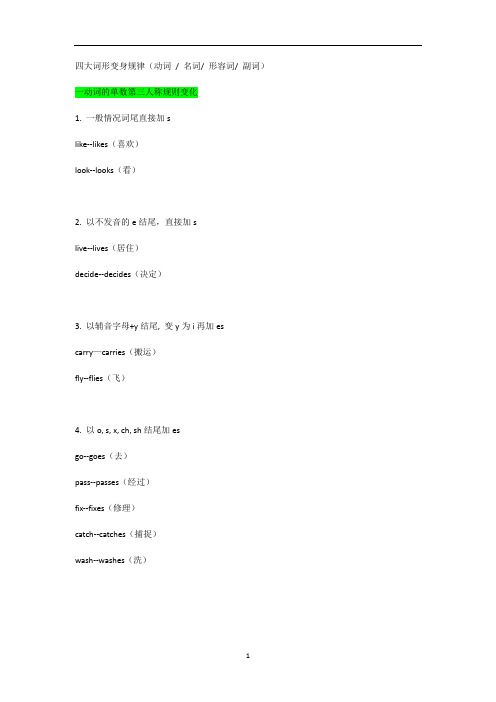
四大词形变身规律(动词/ 名词/ 形容词/ 副词)一动词的单数第三人称规则变化1. 一般情况词尾直接加slike--likes(喜欢)look--looks(看)2. 以不发音的e结尾,直接加slive--lives(居住)decide--decides(决定)3. 以辅音字母+y结尾, 变y为i再加es carry—carries(搬运)fly--flies(飞)4. 以o, s, x, ch, sh结尾加esgo--goes(去)pass--passes(经过)fix--fixes(修理)catch--catches(捕捉)wash--washes(洗)二动词的过去式规则变化1. 一般情况,词尾直接加edwork-- worked(工作)look--looked (看)2. 以不发音的e结尾的单词,直接加dlive--lived(居住)use--used(使用)3. 以辅音字母+y结尾的,变y为i加edstudy--studied (学习)worry--worried(担心)4. 以重读闭音节结尾,且末尾只有一个辅音字母的动词,双写最后的辅音字母加ed stop-- stopped (停止)plan--planned(计划)三动词的现在分词规则变化1. 一般情况,词尾直接加ingdrink--drinking(喝)sleep--sleeping(睡觉)2. 以不发音的e结尾,去e,再加ing.use--using(使用)write--writing(写)3. 以重读闭音节结尾,且末尾只有一个辅音字母的动词,双写最后的辅音字母,加ing.如:put--putting(放置)run--running(跑步)4. 部分以ie结尾的动词,变ie为y,加ingdie--dying(死亡)lie--lying(躺下)四可数名词变复数规则变化1. 一般在名词词尾加"-s"map--maps(地图)bird--birds(鸟)2. 以fe或f结尾的名词,把fe或f变为v加"-es"knife--knives(小刀)leaf--leaves(树叶)3. 以辅音字母加y结尾的名词,变y为i加"-es "baby--babies(婴儿)family--families(家庭)4. 以s, x, ch, sh结尾的名词加"-es"box--boxes(盒子)class--classes(班级)watch--watches(手表)dish--dishes(盘)5. 部分以o结尾的有生命的名词后面加"-es"tomato--tomatoes(西红柿)potato--potatoes(土豆)hero--heroes(英雄)五(单音节/部分双音节)形容词/副词的比较级最高级的规则变化1. 一般情况下,比较级+er ,最高级+estsmall--smaller--smallest(小的)--(较小的)--(最小的)slow--slower--slowest(慢的)--(较慢的)--(最慢的)2. 以不发音e结尾的单词,比较在原级后加-r,最高级在原级后加-st;nice--nicer--nicest(和蔼的)-(较和蔼的)-(最和蔼的)free--freer--freest(免费的)-(较免费的)-(最免费的)3. 以“辅音字母+y”结尾的单词,把y改为i,比较级加-er,最高级加-est;easy--easier--easiest(容易的)-(较容易的)-(最容易的)busy--busier--busiest(忙碌的)-(较忙碌的)-(最忙碌的)4. 以重读闭音节结尾,且末尾只有一个辅音字母的动词,双写最后的辅音字母,比较级再加-er,最高级再加-est;hot--hotter--hottest(热的)--(较热的)--(最热的)big--bigge--biggest(大的)--(较大的)--(最大的)。
初中英语名词动词变化规律
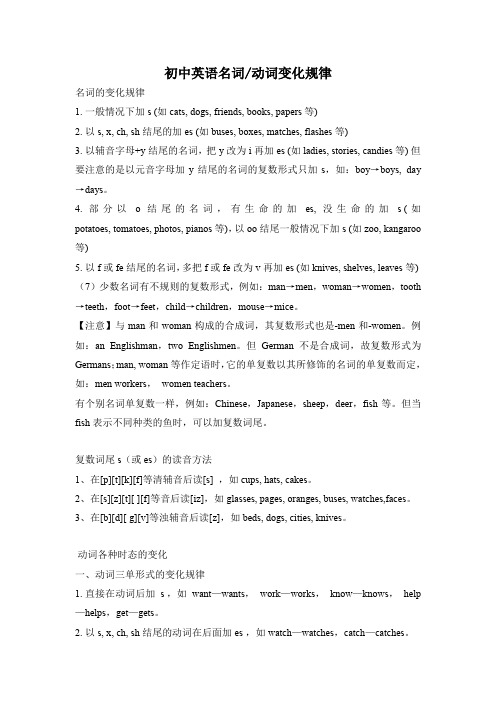
初中英语名词/动词变化规律名词的变化规律1.一般情况下加s(如cats,dogs,friends,books,papers等)2.以s,x,ch,sh结尾的加es(如buses,boxes,matches,flashes等)3.以辅音字母+y结尾的名词,把y改为i再加es(如ladies,stories,candies等)但要注意的是以元音字母加y结尾的名词的复数形式只加s,如:boy→boys, day →days。
4.部分以o结尾的名词,有生命的加es,没生命的加s(如potatoes,tomatoes,photos,pianos等),以oo结尾一般情况下加s(如zoo,kangaroo 等)5.以f或fe结尾的名词,多把f或fe改为v再加es(如knives,shelves,leaves等)(7)少数名词有不规则的复数形式,例如:man→men,woman→women,tooth →teeth,foot→feet,child→children,mouse→mice。
【注意】与man和woman构成的合成词,其复数形式也是-men和-women。
例如:an Englishman,two Englishmen。
但German不是合成词,故复数形式为Germans;man, woman等作定语时,它的单复数以其所修饰的名词的单复数而定,如:men workers,women teachers。
有个别名词单复数一样,例如:Chinese,Japanese,sheep,deer,fish等。
但当fish表示不同种类的鱼时,可以加复数词尾。
复数词尾s(或es)的读音方法1、在[p][t][k][f]等清辅音后读[s] ,如cups, hats, cakes。
2、在[s][z][t][ ][f]等音后读[iz],如glasses, pages, oranges, buses, watches,faces。
英语时态(五种时态语法知识)

一般现在时:一、含义:表示经常性或习惯性的动作;表示经常的状态、客观事实、普遍真理等。
例:I get up at 6:40 every day. 我每天6:40起床。
(经常性动作)She is beautiful. 她很漂亮。
(经常的状态)The sun rises in the east and sets in the west. 太阳东升西落。
(真理)二、结构:主语+be动词(am/is/are)+非动词.主语+实义动词(原形/三单)+其他.三、标志词:always、usually、often、sometimes、every...等。
四、肯定句:I am a student.I usually go to school on foot.Tony takes a walk after dinner every day.五、否定句:be+not;没有be动词的,借助助动词do/does的否定形don’t/doesn’t.I am not a student.I don’t usually go to school on foot.Tony doesn’t take a walk after dinner every day.六、一般疑问句及肯定回答、否定回答:be动词提前;没有be动词的,借助助动词do/does放在句首。
(还要注意一二人称互换哦!)Are you a student?Yes,I am. No,I’m not.Do you usually go to school on foot?Yes,I do. No,I don’t. Does Tony take a walk after dinner every day?Yes,he does.No,he doesn’t.七、特殊疑问句1.What do you often do on the weekend?周末你经常做什么?2.What does Mike usually do?Mike通常做什么?3.How do you go to school?你怎么去上学?4.How does he go to work?他怎么去上班?现在进行时:一、动词ing形式(现在分词)的变化规律:1.一般情况下,直接加ing;climb-climbing sleep-sleeping2.以不发音的e结尾,去e加ing;dance-dancing have-having3.辅元辅结构,双写末尾辅音字母,加ing. run-running swim-swimming二、含义:表示现在(说话瞬间)正在进行或发生的动作。
小学英语英语升降调的规则
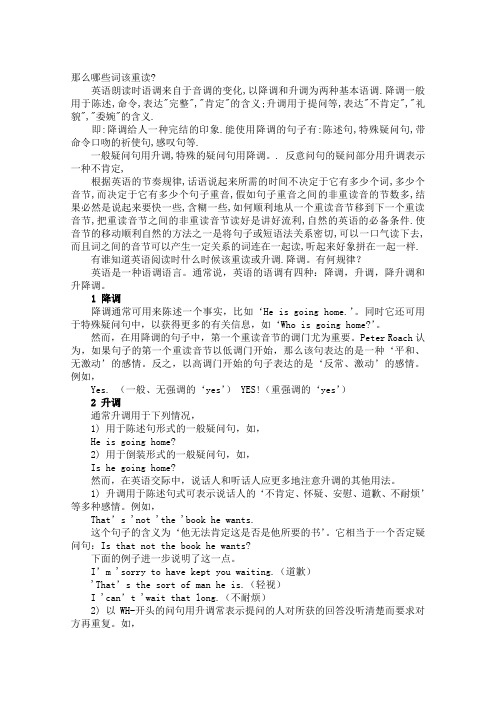
那么哪些词该重读?英语朗读时语调来自于音调的变化,以降调和升调为两种基本语调.降调一般用于陈述,命令,表达"完整","肯定"的含义;升调用于提问等,表达"不肯定","礼貌","委婉"的含义.即:降调给人一种完结的印象.能使用降调的句子有:陈述句,特殊疑问句,带命令口吻的祈使句,感叹句等.一般疑问句用升调,特殊的疑问句用降调。
. 反意问句的疑问部分用升调表示一种不肯定,根据英语的节奏规律,话语说起来所需的时间不决定于它有多少个词,多少个音节,而决定于它有多少个句子重音,假如句子重音之间的非重读音的节数多,结果必然是说起来要快一些,含糊一些,如何顺利地从一个重读音节移到下一个重读音节,把重读音节之间的非重读音节读好是讲好流利,自然的英语的必备条件.使音节的移动顺利自然的方法之一是将句子或短语法关系密切,可以一口气读下去,而且词之间的音节可以产生一定关系的词连在一起读,听起来好象拼在一起一样.有谁知道英语阅读时什么时候该重读或升调.降调。
有何规律?英语是一种语调语言。
通常说,英语的语调有四种:降调,升调,降升调和升降调。
1 降调降调通常可用来陈述一个事实,比如‘He is going home.’。
同时它还可用于特殊疑问句中,以获得更多的有关信息,如‘Who is going home?’。
然而,在用降调的句子中,第一个重读音节的调门尤为重要。
Peter Roach认为,如果句子的第一个重读音节以低调门开始,那么该句表达的是一种‘平和、无激动’的感情。
反之,以高调门开始的句子表达的是‘反常、激动’的感情。
例如,Yes. (一般、无强调的‘yes’) YES!(重强调的‘yes’)2 升调通常升调用于下列情况,1) 用于陈述句形式的一般疑问句,如,He is going home?2) 用于倒装形式的一般疑问句,如,Is he going home?然而,在英语交际中,说话人和听话人应更多地注意升调的其他用法。
一般过去式动词及句型变化规律
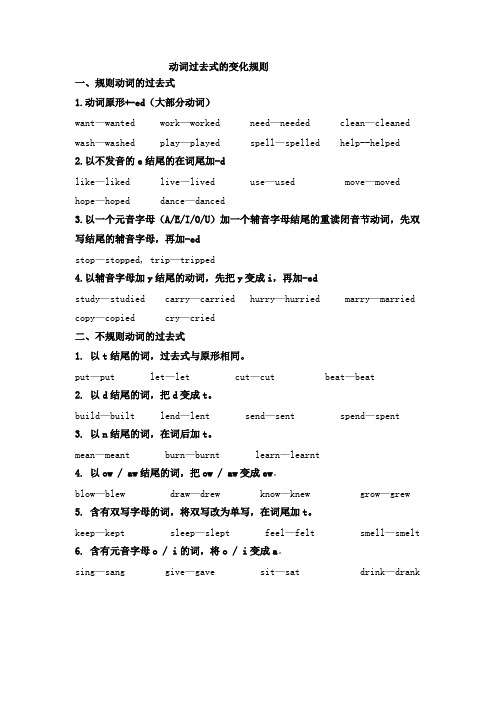
动词过去式的变化规则一、规则动词的过去式1.动词原形+-ed(大部分动词)want—wanted work—worked need—needed clean—cleaned wash—washed play—played spell—spelled help--helped2.以不发音的e结尾的在词尾加-dlike—liked live—lived use—used move—moved hope—hoped dance—danced3.以一个元音字母(A/E/I/O/U)加一个辅音字母结尾的重读闭音节动词,先双写结尾的辅音字母,再加-edstop—stopped, trip—tripped4.以辅音字母加y结尾的动词,先把y变成i,再加-edstudy—studied carry—carried hurry—hurried marry—married copy—copied cry—cried二、不规则动词的过去式1. 以t结尾的词,过去式与原形相同。
put—put let—let cut—cut beat—beat2. 以d结尾的词,把d变成t。
build—built lend—lent send—sent spend—spent3. 以n结尾的词,在词后加t。
mean—meant burn—burnt learn—learnt4. 以ow / aw结尾的词,把ow / aw变成ew。
blow—blew draw—drew know—knew grow—grew 5. 含有双写字母的词,将双写改为单写,在词尾加t。
keep—kept sleep—slept feel—felt smell—smelt 6. 含有元音字母o / i的词,将o / i变成a。
sing—sang give—gave sit—sat drink—drank我们目前已学动词的过去式词义原型过去式词义原型过去式am/is was有have hadare were听见hear heard 打破break broke开始begin began 带来bring brought使…受伤hurt hurt 建造build built保持keep kept 购买buy bought知道know knew 抓住catch caught学习learn learnt 选择choose chose离开leave left 来come came借出lend lent 花费cost cost让…做…let let切割cut cut丢失lose lost 做do did制作make made 画画draw drew遇见meet met做梦dream dreamt支付pay paid 喝drink drank放put put驾驶drive drove读read read 吃eat ate骑ride rode 摔跤fall fell跑步run ran喂feed fed说…say said 感觉feel felt看见see saw找到find found卖sell sold 飞fly flew送、寄send sent 忘记forget forgot摇shake shook 得到get got唱歌sing sang 给give gave坐sit sat去go went睡觉sleep slept 生长grow grew说speak spoke词义原型过去式词义原型过去式站立stand stood扔throw threw打扫sweep swept醒来wake woke游泳swim swam穿wear wore拿走take took赢得win won教teach taught写write wrote告诉tell told想think thought什么时候用一般过去时呢1.表示在过去某一时间内发生的动作或情况◆①带有确定的过去时间状语morning five daysyesterday afternoon one week agoevening three minutesthe day before yesterday three hoursyear morninglast month one dayday the other day that year 其他when I was youngmorning just noweg. I went to school on foot yesterday.I finished my homework last week.◆②没有确定的过去时间状语时eg. I thought you were ill. 我原以为你生病了(这句话说明在说话之前我以为你病了,但是现在我知道你没病)2.表示过去一段时间内经常或反复发生的动作(常与always,never,often 等频度副词连用)eg. Peter always carried an umbrella. Peter 常常带着伞I never drank wine. 我从不喝酒一般过去时的句型肯定句:主语+行为动词过去式/be动词过去式eg : We played football yesterday.I was happy last night.否定句:did not / didn’t + 行为动词原型Was not / wasn’t + 其他Were not / weren’t + 其他eg:I didn’t finish my homework.I wasn’t happy last night.We weren’t finish our team work.一般疑问句:Did + 主语+ 行为动词原型?Was /Were + 主语+ 其他成分eg: -----Did you go shopping yesterday?-----Yes, I did. / No ,I didn’t.Was she 15 years old last year?特殊疑问句;特殊疑问词+ did + 主语+ 行为动词原型?特殊疑问词was / were + 主语+ 其他成分?eg: Where did you go on vacation?When and where were you born?一般过去时练习题1、单项选择:从下列各题后所给的四个选项中选择最佳答案填空。
英语基变序有规律口诀
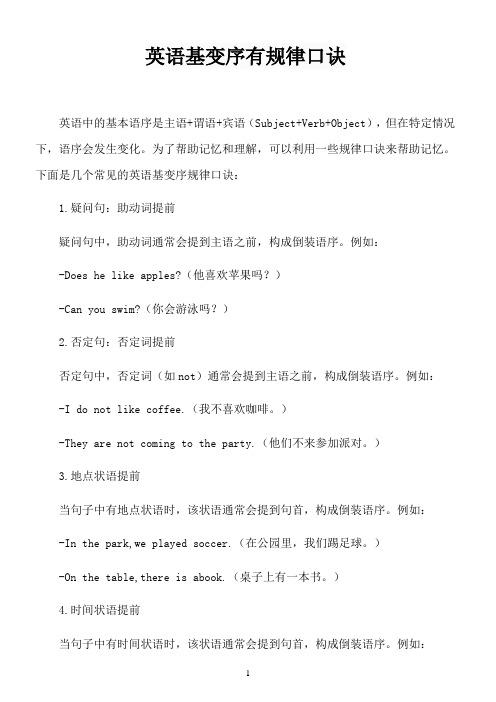
英语基变序有规律口诀英语中的基本语序是主语+谓语+宾语(Subject+Verb+Object),但在特定情况下,语序会发生变化。
为了帮助记忆和理解,可以利用一些规律口诀来帮助记忆。
下面是几个常见的英语基变序规律口诀:1.疑问句:助动词提前疑问句中,助动词通常会提到主语之前,构成倒装语序。
例如:-Does he like apples?(他喜欢苹果吗?)-Can you swim?(你会游泳吗?)2.否定句:否定词提前否定句中,否定词(如not)通常会提到主语之前,构成倒装语序。
例如:-I do not like coffee.(我不喜欢咖啡。
)-They are not coming to the party.(他们不来参加派对。
)3.地点状语提前当句子中有地点状语时,该状语通常会提到句首,构成倒装语序。
例如:-In the park,we played soccer.(在公园里,我们踢足球。
)-On the table,there is abook.(桌子上有一本书。
)4.时间状语提前当句子中有时间状语时,该状语通常会提到句首,构成倒装语序。
例如:-Yesterday,I met my friend.(昨天,我见了我的朋友。
)-In the morning,we go for a jog.(早上,我们去慢跑。
)5.原因状语提前当句子中有原因状语时,该状语通常会提到句首,构成倒装语序。
例如:-Because of the rain,we stayed at home.(因为下雨,我们呆在家里。
)-Due to the traffic,he arrived late.(由于交通堵塞,他迟到了。
)6.强调句:It is/was...that...强调句中,主语通常使用it,并且谓语动词与宾语之间加上一个连接词that。
例如:-It was Mary who won the competition.(是玛丽赢得了比赛。
英语动词单三变化规律

英语动词单三变化规律英语动词的单三变化规律是指在句子中,当主语是第三人称单数时,动词需要进行变化。
一般情况下,在动词后面加上-s或-es来表示单三形式。
在大多数情况下,当动词以辅音字母+ 'y' 结尾时,将 'y' 变为'i' ,然后再加上-es。
例如:study -> studies,carry -> carries。
当动词以辅音字母+ 'o' 结尾时,一般直接加上-es。
例如:go -> goes,do -> does。
但是有一些动词在单三形式下会发生不规则变化。
例如:1. be -> is,am,are2. have -> has3. do -> does4. go -> goes5. say -> says6. get -> gets7. run -> runs8. eat -> eats9. take -> takes10. make -> makes除了以上不规则动词外,还有一些动词在单三形式下会发生其他变化。
例如:1. fly -> flies2. teach -> teaches3. catch -> catches4. watch -> watches5. drive -> drives6. study -> studies7. carry -> carries8. try -> tries9. cry -> cries10. reply -> replies总体来说,了解英语动词的单三变化规律对于正确使用动词形式非常重要。
不仅可以帮助我们准确表达句子的主谓一致,也能够提高英语语法的正确性。
熟练掌握这些规律,并通过不断的练习和阅读来巩固和运用,将有助于提高英语写作和口语表达的能力。
英语句型转换常规基本句式的转换方法

“句型转换”有两种形式,一是按要求转换句型(如:要求将陈述句转换为否定句或一般疑问句;改为祈使句或感叹句;对划线部分提问等);二是“同义句转换”。
本题型在中考中重要是测试我们运用英语“句型”的能力。
“四位一体”的“句型转换”专项训练,就是为了发展我们这方面的能力。
第一类题型的转换,重点是基本句型的运用,一般都有规律可循。
除了熟记基本句式的结构外,还要注意some, any; already, yet 等词在转换时的变化。
第二类句型转换(同义句转换)应该作为我们复习训练的重点。
用不同的句式表达相同的意思,它标志着一个人的外语能力水平。
提高此项能力的关键是熟悉句型结构,自如运用。
通过“专项训练”,积累一定数量的相关句式,达到脱口而出,信手拈来,出神入化。
基本句式的转换主要是指“肯定句、否定句、一般疑问句、特殊疑问句、反意疑问句和选择疑问句、祈使句、感叹句”的相互转换。
句式的转换一般都有一定的规律可循,我们就是要掌握它们的变化规律,能够举一反三,见此知彼。
(一)肯定句、否定句、一般疑问句的相互转换这三种句型的转换有共同的规律可循,有几个要点必须牢记。
我们可以把各种句式归为两大类:1、含有的be动词、助动词和情态动词的句子;2、只有行为动词的句子。
第1类的句子,肯定句改为否定句时,一律在be动词、助动词和情态动词后加“not”,改为一般疑问句时,一律将be动词、助动词和情态动前移到句首(首字母大写)。
肯定回答用“Yes”;否定回答用“No”。
“Yes”或“No”后面的主语必须用代词,“No”后面必须用否定缩略式。
如:将下列句子改为否定句、一般疑问句,并做肯定、否定回答:1. There are some computers in this school. (be动词)There aren’t an y computers in this school.Are there any computers in this school? (Yes, there are. / No, there aren't.) 2. Li Ming’s father can drive the car. (情态动词)Li Ming’s father can’t drive the car.Can Li Ming’s father drive the car? (Yes, he can. / No, he can’t.)3. She has already finished his homework now. (助动词)She hasn’t finished his homework yet.Has she finished his homework yet? (Yes, she has. / No, she hasn’t.)第2类句子必须借助助动词do; does; did。
- 1、下载文档前请自行甄别文档内容的完整性,平台不提供额外的编辑、内容补充、找答案等附加服务。
- 2、"仅部分预览"的文档,不可在线预览部分如存在完整性等问题,可反馈申请退款(可完整预览的文档不适用该条件!)。
- 3、如文档侵犯您的权益,请联系客服反馈,我们会尽快为您处理(人工客服工作时间:9:00-18:30)。
She can’t recite …. Can she recite …?
Yes, she can.
Yes, we have.
No, we haven’t.
6. The child can sing many English songs.
Don’t stand up.
如何把肯定句变成一般疑问句?
Ⅰ.首先,也要看一看句中有没有“特殊定式动词”, 如果有,就将“特殊动词”直接提到句首,注意大小 写,句末问号。即“一提二改三问号”的步骤。
1. The old man is a famous scientist. → Is the old man a famous scientist? 2. There are hundreds of people in the zoo on Children’s Day. → Are there hundreds of people in the zoo on Children’s Day? 3. You must hand in your papers on time tomorrow. → Must I hand in my papers on time tomorrow? 4. I was at the library a moment ago. → Were you at the library a moment ago? 5. The boy can ride a bike. → Can the boy ride a bike?
但如果have, has, had与其他词一起构成一个新的 词组,则have, has, had已经成为新词组中不可分 割的一部分,这时的have, has, had就只能当作行 为动词来看待。
e.g. have Chinese / English / maths / history… have a class have a rest / break have a good time have breakfast / lunch / dinner
I don’t often play …. Do you often play …? No, I don’t.
8. He wants me to go to his house for lunch. 9. Mr White taught physics in his hometown five years ago. Mr White didn’t teach ….
They didn’t find …. Did they find …?
Yes, they did.
No, they didn’t. No, they don’t.
Yes, she does.
No, she doesn’t.
13. Mother will buy me a notebook computer on my birthday.
She has lunch at school. → She doesn’t have …. Does she have…? Yes, she does. No, she doesn’t.
将下列句子变为否定句、一般疑问句,并作简短的肯定、否定回答:
1. My father is an engineer.
Ⅱ.如果句中没有“特殊定式动词”,就要找出句中的行 为动词,根据行为动词的人称和时态,在句首确定加Do 或Does或Did, 并将不是原形的行为动词还原成原形,注 意大小写,句末问号。即“一加二改三问号”的步骤。 1. I often get up early in the morning. → Do you often get up early in the morning? 2. My brother likes to read English aloud in class. → Does your brother like to read English aloud in class? 3. Mr Smith taught English in Hainan in 1999. → Did Mr Smith teach English in Hainan in 1999? 4. They plant lots of trees in the hill every year. → Do they plant lots of trees in the hill every year? 5. She usually plays the piano in the evening. → Does she usually play the piano in the evening? 6. The workers repaired the machine last week. → Did the workers repair the machine last week?
have, has, had 是“拥有”的意思时,既可当“特 殊定式动词”看待,也可当行为动词看待。 e.g. He has a new bike. →
① He hasn’t a new bike.
Has he a new bike?
Yes, he has.
No, he hasn’t.
② He doesn’t have a new bike. Does he have a new bike? Yes, he does. No, he doesn’t.
3. She can recite passages from Hamlet by Shakespeare.
No, he wasn’t. No, she can’t.
4. We have a lot of work to do today.
5. She had a good time yesterday.
如何把肯定句变成否定句?
Ⅰ.首先,要看一看句中有没有“特殊定式动词”, 如果有,就在“特殊定式动词”后面加not即可。 1. Kate was born on June 6, 1996. → Kate wasn’t born on June 6, 1996. 2. My family will move to Shanghai next month. → My family won’t move to Shanghai next month. 3. She can swim. → She can’t swim. 4. Tony is a middle school student. → Tony isn’t a middle school student. 5. There are many apples in the basket. → There aren’t many apples in the basket. 6. It is cloudy and windy today. → It isn’t cloudy and windy today.
Did Mr WNo, he didn’t.
He doesn’t want …. Does he want …?
Yes, he does.
No, he doesn’t.
10. They found a nice place to live at last.
注意:
如果行为动词是现在式,则在don’t和doesn’t之 间确定。动词是原形,就don’t; 动词后面有加s或es, 就doesn’t.
如果行为动词是过去式,就didn’t. 还要记得将不是原形的行为动词还原成原形。
另:肯定祈使句变否定形式时,直接在动词前面加Don’t 。 e.g.
Stand up. →
The child can’t sing …. Can the child sing …?
Yes, she did.
No, she didn’t.
Yes, she can.
Yes, I do.
No, she can’t.
7. I often play basketball with my friends after school.
2. Shakespeare was an actor with plays and poems.
Shakespeare wasn’t an …. Was Shakespeare an …? Yes, he was. My father isn’t an …. Is your father an …? Yes, he is. No, he isn’t.
The young man didn’t finish …. Did the young man finish …?
11. The people speak English in many countries.
12. She asks us to help her with her English.
The people don’t speak …. Do the people speak …? She doesn’t ask …. Does she ask …? Yes, they do.
Ⅱ.如果句中没有“特殊定式动词”,就要找出句中的行 为动词,根据行为动词的人称和时态,在行为动词之前确 定加don’t或doesn’t或didn’t, 并将不是原形的行为动词还 原成原形,其他地方没有变化。
1. I clean our classroom every day. → I don’t clean our classroom every day. 2. Mike goes to the cinema with his parents once a week. → Mike doesn’t go to the cinema with his parents once a week. 3. The child played the computer games in the internet bar last night. → The child didn’t play the computer games in the internet bar last night. 4. We get up at 6:00 in the morning. → We don’t get up at 6:00 in the morning. 5. He often comes to school by bike. → He doesn’t often come to school by bike. 6. I watched TV with my family yesterday evening. → I didn’t watch TV with my family yesterday evening.
